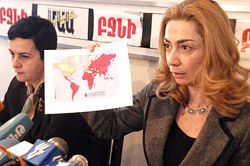This is what director of the TI branch in Yerevan Amalya Kostanyan told journalists. What does it mean to have 2.9 points? The rating is based on a scale of 0-10. The lowe the score, the more spread corruption is. For example, out of the 163 countries rated, Haiti scored the lowest with a 1.8 points. The least corrupted countries are Finland, Iceland and New Zealand. The score of each of the countries is 9.6. If the corruption conception number is les than 3, that means that corruption in those countries is widespread. Armenia falls into the list of those countries. Last year, Armenia scored 2.9 points. “The number hasn’t changed much since last year, despite the fact that the government has been working towards lowering the score for the past three years,” said Mrs. Kostanyan.
Armenia, with its 2.9 points, shares the 93rd place with five countries-Argentina, Bosnia-Herzegovina, Eritrea, Syria and Tanzania. It is worth mentioning to readers that in last year’s report, Armenia was in 88th place. Althouh, according to Kostanyan, she made an error while looking. “The value of the number is much more important. As for where we’re on the list, I must say that this year there are new countries on the list and that may have an influence on where the country places.” Since we Armenians like to compare their country with other countries, let’s mention the fact that our neighbors differ from us materialistically. Although Azerbaijan and Georgia got a smaller value, however compared to last year they have improved. Instead of 2, Georgia got 2.8, while Azerbaijan’s 1.9 moved up to 2.4.
So, it turns out that Armenians only talk about fighting against corruption, but they’re really not doing anything. “We haven’t seen any high-ranking official get punished…we have laws, which aren’t applied, there is no law for equality,” said Mrs. Kostanyan. The latter considered the abovementioned as the failure of the government. “The authorities are on the verge of the upcoming elections and they’re not taking on the responsibility for anything. We call on the government to respond to this and tell us why nothing else changes besides the approval of laws.” According to Kostanyan, 2006 was a rather ineffective year when it comes to fighting against corruption, but the corresponding commission hadn’t held a session for 10 months continuously. It’s worth mentioning that the TI rate doesn’t’ take into consideration the corruption in the political field of Armenia, in particular the elections and the referendum and according to Mrs. Kostanyan, the constitutional amendments referendum of last year is a great example of corruption. However, the results of that referendum, which was based on electoral fraud were approved by the same countries and international organizations that criticize Armenia for having a high level of corruption. Isn’t this the application of a double standard? “Of course there are double standards,” said A. Kostanyan, adding that it’s not the first year that the TI has been applying the double standards.
In the report, TI has emphasized the connection between the high level of corruption and poverty. So, this means that the higher the level of corruption, the higher the level of poverty. Journalists asked Kostanyan how they could conceptualize the fact that corruption remains at a high level, yet economy is growing at a two-digit rate, but the statistics prove that there is poverty in the country. “The economic rise is created by Armenians. But who actually gets something out of the economic rise, that’ s a different story. So, it’s quite possible that the economy rise and the level of corruption rises too,” said Kostanyan. Mrs. Kostanyan mentioned that besides the TI, they have also conducted a survey on corruption in Armenia with help from the UN. “We have the results for all fields. But we will give out the results only in December.” Kostanyan called on journalists to be patient, but informed that the results of their studies are negative.

